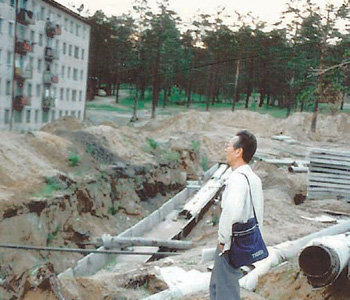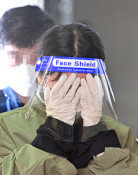Japanese mans tumultuous life due to war
Japanese mans tumultuous life due to war
Posted August. 15, 2015 07:10,

The Japanese Emperors Army were "devils" who mercilessly killed civilians at the Great Kanto disaster and the Nanjing massacre. However, can this be the image of the entire Japanese military? Many Emperors Soldiers were ordinary people.
This book showcases images of war that such Japanese people experienced. Kenji Okuma, who was born in 1925, was deployed as member of the Kwantung Army after being conscripted in November 1944. Then, after Japans defeat, he was taken as prisoner of war by the Soviet military, and forced to labor at a Siberian camp, before returning home. Okumas son, a professor of general policy department at Keio Gijuku University in Japan, wrote the book based on Okumas oral statement.
Okuma was deployed to the aviation communication regimen in Ningan district, southeastern area of Heilongjiang Province in Manchuria, but never engaged in war or fired a shot. After learning Japans defeat, he expressed joy, saying, Now I can return to Japan and meet my family, but about 640,000 people including Japanese soldiers (including about 10,000 Koreans) were taken as prisoners by the Soviet military and were allocated to camps in Siberia and elsewhere.
Okuma was placed at a camp in Chita district 24 in Siberian federal district. Starting with a prisoner who died in a train car on the way to the camp, 45 of the 500 prisoners who were placed with him perished until he returned home several years later. They died of intense cold and malnutrition. The death rate of Siberian prisoners is known to reach about 10 percent.
Stories of return that have been published by Siberian prisoners are mostly written by officers or intellectuals, and hence contained a sense of agitation for hopeless passage of time and their youth, but Okuma said, I was only desperate for surviving.
Despite having small physique, Okuma fortunately survived forced labor and took a repatriation ship in August 1948. Despite having longed for returning home, he did not have any special emotion about the Japanese flag flying in the ship. He said, I used the Japanese flag as cloth-wrapper from 1945.
Recalling his memories before joining the military, he said, I never thought I supported the war, nor did not oppose it. I was just swept away. Commenting on his military service, he said, It was like I was sent to (Manchuria) to become a prisoner. On his feeling Japans defeat, he stated, I wanted to get an apology from emperor Showa for his responsibility for the war that left countless people killed.
The book describes Okumas personal history before and after his joining the military in the context of historical incidents and change of Japanese society. It mirrors daily living of ordinary Japanese people who got impoverished due to lack of resources during the war, and sought means of living by taking all different jobs after the war. Except the fact it is a story about Japan, it reads like a story of parents or grandparents in Korea, who lived through tumultuous modern history of the nation.
One cannot be unconditionally forgiven just because he was just a rank-and-file solider, considering that war and massacre is executed by ordinary people who only followed orders without giving serious thought. Okuma also would have killed enemy soldiers if he was deployed to a unit that fought the Chinese military or Koreas armed resistance forces.
Okuma started unraveling problems of past history in 1988 by participating in the "group of anti-war soldiers" that pursue peace. He recalls Korean Oh Ung-geun, who had been taken as a Siberian prisoner with him but was excluded from the list of beneficiaries of the Japanese governments compensation, and sent the latter half of 100,000 yens (800 U.S. dollars) that he received from the Japanese government in 1990. In 1996, he and Oh jointly filed a lawsuit against Japan, claim that The Japanese government should also make compensation to Koreans who were taken as prisoners in Siberia, but lost the case.
People live ordinary life, but experience several crises, and conduct heroic behaviors, the author said. My fathers trajectory is just the average path of Japanese people. He indirectly expressed, but he means that peace comes from conscience of powerless, ordinary people.
jjj@donga.com







